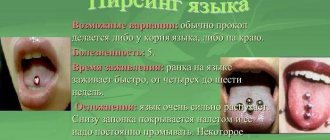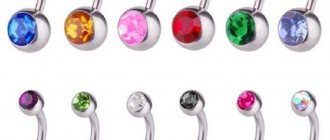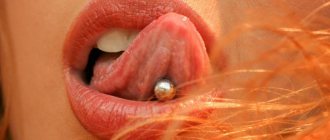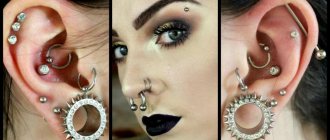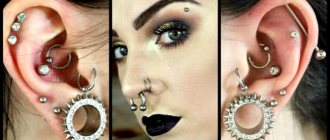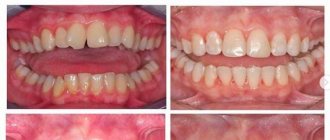Photo from the site: biokrasota.ru
To be completely honest, piercing has become so popular at this time that few of the representatives of modern youth do not have such a bright, but at the same time, not quite ordinary decoration of their own body. The piercing of the genitals or nipples probably causes the most controversy and misunderstanding, but tongue piercing is also a rather controversial issue. Moreover, if the first options are, nevertheless, most suitable for completely extreme types, then tongue piercing is done by many people today, and their reasons for this can be very diverse. It’s worth understanding why people generally do tongue piercing, why they like it, and whether there are contraindications, before making such a rather important decision as piercing.
What risks exist?
Dental status is the condition of the patient’s oral cavity, assessed on the basis of anamnesis, the results of an external examination, and the intensity of caries. At the end, the KPU index is determined - this is the average number of teeth affected by caries and its complications (K), filled (P) and removed (U). The total sum of these indicators has a certain digital value, namely:
| Index | Patient's oral condition |
| 0 | Healthy people and those who are only at risk. |
| From 1 to 4 | Compensated condition (the resulting defect in the dentition will not subsequently affect the shape and structure of the periodontium). |
| From 5 to 7 | Subcompensated state (intrasystem restructuring occurs in the dentition and periodontium). |
| Over 7 | Decompensated state (intrasystemic restructuring is complemented by inflammatory phenomena in the periodontium and its dystrophy; pathological gingival and bone pockets appear, atrophic processes in the periodontium are observed). |
After the tongue is pierced and the jewelry is installed, a person is considered to be included in the risk group, because now existing problems can worsen at any time and new ones can arise. In addition, few people ask about the health of their teeth before getting a piercing. If such clients at the time of the puncture had, for example, dental caries even at the initial stage (a focus of microorganisms that destroy tooth enamel), an infection in the oral cavity may develop.
Contraindications
Absolute restrictions on the intervention:
- age under 18 years;
- pregnancy and lactation period;
- chronic diseases in the acute stage;
- infectious diseases, even a common cold;
- epileptic seizures;
- psychological disorders;
- low blood clotting;
- alcohol and drug intoxication;
- weakened immune system;
- diabetes;
- hemophilia.
Tongue piercing is unacceptable in case of weakened immunity, mental disorders and serious chronic diseases
It is not advisable for anyone under 18 years of age to have their tongue pierced.
In dentistry, tongue piercing is considered as a source of development of a large number of complications:
- General: bleeding (large blood vessels may be affected during the procedure), excessive production of saliva, impaired speech, chewing and swallowing functions, allergic reactions, bacteria (entering the bloodstream can cause inflammation of the inner lining of the heart and other organs), increased risk of hepatitis infection B, C and HIV infection.
- Local: pain after a puncture for several days, the occurrence of defects in the hard tissues of the teeth (enamel cracks), swelling of the soft tissues (especially dangerous if this makes breathing difficult), destruction of restorations, inflammatory processes of the gums (gingivitis, periodontitis), exposure of the necks of the teeth, increased sensitivity of teeth, proliferation of scar tissue, appearance of ulcers on the oral mucosa, local atrophy of the papillae of the tongue at the site of contact of the fixing elements [1, 2].
One of the serious violations of piercing is, in most cases, the lack of any control over the client’s condition after this cosmetic operation, so it is quite easy to miss the onset of serious complications.
If you decide to get an oral piercing, I strongly recommend that you consult with your dentist before getting a piercing. Nesterenko I. A., dentist-therapist [3]
Do not play with or remove jewelry
Moving the jewelry can increase pain and irritation and lead to the appearance of new bacteria in the holes.
The only time you should touch it is during cleansing.
It may also be tempting to take out your jewelry, but this may actually do more harm than good.
Removing the jewelry will not only cause additional irritation, but will also allow the new piercing to be covered up. This can trap bacteria and allow the infection to spread beyond the puncture site.
Preparation for the procedure
To avoid the development of complications, it is important to know several points before starting the procedure:
- Select the first earring wisely: the alloy of the product should not oxidize. The first bar should be larger in size than the permanent one - this is due to the fact that after the puncture the tongue swells. When the canal heals and the swelling subsides, the temporary product is replaced with a smaller piece of jewelry. There should be no samples, engravings, or various patterns on the surface. If the bar is not smooth, the puncture channel takes longer to heal, as it is injured by the patterns. In this case, the healing period can be several months.
- Tongue treatment: during the operation, the specialist himself disinfects the puncture site. After the procedure, you will need a care product and rinse to rinse your mouth, which will be recommended by a specialist.
- Selecting a clinic and specialist: the main thing is health and safety, so it’s worth finding an experienced and trusted piercer. The place where the procedure is performed must be clean. A prerequisite for the operation of such establishments is the presence of a sterilization zone where disinfection equipment is located (trays, boxes, dry-heat ovens).
Choosing jewelry for girls (women), men
Before the procedure, the piercer will help you choose jewelry if the client has not purchased it in advance. If you want to buy it yourself, then a few tips below will help you make the right choice.
It is worth noting that there is no clear division between women's and men's jewelry. But unwritten rules still exist:
- Men's jewelry is distinguished by a clear geometric pattern (broken lines, checkered patterns), while women's jewelry is distinguished by a smooth transition of lines and a rounded shape.
- Men's jewelry is massive, while women's jewelry is graceful and miniature.
- Men's jewelry is characterized by laconicism - their design often uses dark or light muted matte colors. Women's, on the contrary, are distinguished by a variety of shapes, colors and inlay with different stones, ranging from simple rhinestones to diamonds.
What not to do after piercing
- Tugging and removing jewelry: the less you disturb the wound, the faster it will heal. If you remove the barbell in the first 2 months, you will not be able to put it back on your own and will have to go to the piercer again.
- Eating too hot, salty and spicy foods: such foods irritate the mucous membrane, and especially the tender and not yet healed tissue in the piercing area. Particles of solid food can get into a fresh puncture, which in turn can cause an infection. Porridge, yoghurt, etc. are best.
- It is undesirable to smoke, drink alcohol and take blood thinning medications: such drugs dilate blood vessels and the wound takes longer to heal. Nicotine generally suppresses the general immune system, increasing the healing time.
Pros and cons of piercing
Piercing has a number of advantages.
- The procedure is painless - pain during the puncture is practically not noticeable and is quite tolerable.
- Quick disguise - there are situations when an earring sticking out of the tongue is not at all appropriate, for example, during business negotiations or at an official reception. In this case, you can purchase a flesh-colored barbell.
- Psychological component - in some situations, piercing helps a person to assert himself, become more confident in himself and his own appearance.
- Easy removal - if you are tired of the stud, just remove it, and the hole will gradually close up.
Despite the large number of advantages, punctures have their downsides.
- Changes in diction - a person may begin to have a slight lisp or have difficulty pronouncing some sounds.
- Long healing after the procedure - after about 1-2 months, the tongue will get used to the foreign body and completely adapt to it.
- Disapproving reaction from relatives - unfortunately, not all close people will accept your choice, but on the contrary, they will dissuade you and ask you to get rid of such jewelry,
- Increased salivation - manifests itself in most cases.
- The risk of ingesting cloves increases during sleep, when a person does not control himself.
the puncture is almost painless
two tone piercing
Care instructions
Instructions on how to properly care for your tongue piercing:
- In the first days after the procedure, food should be liquid or mushy.
- In the first 2 weeks after piercing, you should completely avoid dairy products in your diet.
- To prevent the piercing and wound from causing an infection in the mouth area, it is necessary to carefully care for the pierced area as prescribed by a specialist.
- Teeth should be brushed after every meal.
- Rinse your mouth several times a day with a special antiseptic that is intended for the oral cavity and recommended by a specialist.
- When you need to touch the earring, be sure to wash your hands thoroughly with antibacterial soap to prevent infection from getting into the earring.
- Once a month you need to clean your jewelry. The earring is completely removed, cleaned and boiled in a soda solution.
If you follow these rules, installing jewelry in the mouth and subsequent wearing will not cause discomfort.
Piercing has a lot of fans - it is an original and beautiful decoration of the tongue. However, before deciding on such a procedure, it is important to consult a specialist and become familiar with the contraindications and consequences.
List of sources:
- Elaine Angel, Piercing: An Encyclopedia. Handbook for master and client // URL: https://coollib.com/b/425142/read#t4 (access date: 10/03/2020).
- Fedotova Yu. M., Vodolazhskaya K. D. The influence of piercing on dental health // International Student Scientific Bulletin. — 2021. — No. 6.; URL: https://eduherald.ru/ru/article/view?id=16684 (date of access: 10/03/2020).
- Oral piercing, Nesterenko I. A., NOVOSTOM - Association of Private Dental Clinics // URL: https://www.novostom.ru/stati/pirsing-polosti-rta/ (access date: 10/03/2020).
Clean the area two to three times daily
Regular cleansing is the best way to get rid of bacteria and prevent further irritation. Morning and night cleaning are ideal. You can also rinse the puncture site with saline solution after each meal.
With pre-prepared saline solution
A ready-made saline solution is the easiest and most effective way to clean any piercing. You can buy them over-the-counter (OTC) at a piercing shop or local pharmacy.
To clean your piercing:
- Dampen a clean cloth or durable paper towel with the solution. Avoid using cotton balls, tissues, or thin towels as they may get caught in the jewelry and cause irritation to the piercing.
- Gently wipe the cloth or towel on each side of the jewelry. Do not rub or touch as this will cause irritation.
- Repeat this process as many times as needed. There should be no crust on the decoration or around the hole.
Why is the tongue pierced?
It is widely believed that tongue piercing is done for sexual pleasure, which the earring gives the partner, causing additional sensations. However, girls often get pierced simply for the sake of fashion or to self-identify with a group of people belonging to a specific subculture. Another reason is the desire to stand out, to become different from everyone else.
Does it hurt to pierce your tongue?
According to reviews from those who have undergone the operation, the puncture itself is a matter of seconds, quite tolerable. It will hurt later, during healing. The tongue is highly sensitive. Because this organ is in constant motion, with a wound in the middle, it will hurt until it heals completely. To reduce pain:
- have the operation performed by a trusted specialist;
- care for the wound;
- do not smoke;
- do not drink alcohol;
- talk less at first;
- Avoid hot, spicy foods.
Watch what you eat and drink until it heals completely
What you eat matters, especially if you have a wound in your mouth—in this case, an infected piercing.
Do
As your tongue piercing heals, focus on gentle products that are less likely to get on your jewelry.
It includes:
- ice cream
- mashed potatoes
- yogurt
- oatmeal
Anything chewy may require an extra salt rinse after eating. At this time, you should choose water. Tongue piercing tattoos of the body and face to enlarge individual parts.
Not to do
Extremely crunchy foods, such as chips, can cause additional pain and irritation. You should also avoid pepper, chili powder and other spices.
Alcohol can thin the blood and also damage the cells around the piercing. This may prolong healing time and increase the risk of complications of the body and face to increase certain parts of the beauty salon.
Coffee can also thin the blood. If you don't want to take a temporary break, reduce your usual intake until the infection goes away.
Something else to remember
Cleaning your piercing is important, but it's just part of a larger care plan.
The ability to evaluate everything that may come into contact with your tongue - and adjust accordingly. Can help you reduce the amount of bacteria, debris and dirt that gets into your piercing.
During healing:
- Refrain from using lipstick, lip gloss and other tattoo lip products. You may have to throw away any products you use while the infection is active.
- Avoid sharing food and drinks to minimize the spread of infectious bacteria.
- Avoid open-mouth kissing and oral sex to reduce the transfer of bacteria and saliva.
- Wash your hands before touching your mouth to prevent the spread of germs.
